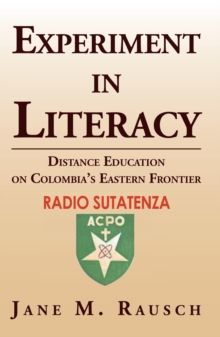In his recent thesis, Radio Sutatenza y Accin Cultural Popular (ACPO): Los Medios de Comunicacin para la Educacin del Campesino Colombiano, (Bogot: Universidad de los Andes, 2009) Jos Arturo Rojas Martnez offers a comprehensive summary of the efforts of Radio Sutatenza, the radio network begun in 1947 by padre Jos Joaqun Salcedo, to create escuelas radiofnicas (radio schools) for the purpose of teaching illiterate adult campesinos (peasants) throughout Colombia not only how to read and write, but also how to better their living conditions and those of their communities. Within twenty years, the project which Rojas Martnez describes as the most important radio experiment of the Catholic Church, grew to include more than 20,000 individual radio schools with an enrollment of some 160,000 to 220,000 students.
Consolidated within the Catholic Church in 1949 as Accin Cultural Popular (ACPO), the schools were reinforced by a widely read weekly newspaper, El Campesino (1958-1989), and the publication of cartillas (primers) and books to reinforce the lessons provided via the radio. The program reached its height in the 1970s, but by the 1980s, insurmountable problems began to appear.
Disagreements between church authorities, competition from commercial radio stations, conflicts between the leftist revolutionaries, and withdrawal of funding by the national government forced the leaders of ACPO to sell the Sutatenza stations to the radio channel CARACOL.
By the 1990s the program had disappeared, but not before it had changed the lives of thousands of campesinos throughout Colombia. Because throughout the world educators hailed Radio Sutatenza during the 1950s and 1960s as a unique and practical way to teach illiterate adults, its methods were closely studied and copied by other countries in Latin America and Africa. The published bibliography concerning the institute is immense, yet, as Jos Arturo Rojas concludes, many aspects of ACPO and the Radio Sutatenza experience remain to be investigated. (p.94). One such aspect is the impact the radio schools had on the inhabitants of one Colombian frontier regionthe Llanos Orientales. The Llanos Orientales or eastern tropical plains, are vast grasslands, that stretch eastward from the towering Eastern Andean Cordillera to continue on into Venezuela.
Bisected by tree-lined, fast-flowing tributaries that join the Orinoco River, the region comprises 220,000 square miles or 30% of Colombias territory, but until the mid twentieth century, it was largely a lightly-populated frontier, isolated from the Andean heartland by the barrier posed by the mountain range. In addition to the problem of communication (only one unreliable road linked Bogot to the town of Villavicencio, the gateway to the Llanos), the harsh climate (nine months of heavy rain. three months of drought) and the prevalence of endemic tropical diseases deterred most would-be colonists from settling there. Nevertheless, by 1951 the population had reached 115,124 divided among four political entities: the three national territories of the Intendencia del Meta, the Comisaras Especiales of Arauca and Vichada; and Casanare, a province of the Department of Boyac. Since mountains do not necessarily posed insurmountable barriers to radio waves, it seems reasonable to expect that the arrival of Radio Sutatenza helped break down the traditional isolation of the people in the Llanos. The purpose of this book is to test this proposition by analyzing the impact ACPO and Radio Sutatenza had on the inhabitants of the most prosperous of the Llanos territories, the Intendencia del Meta which became the Departamento del Meta in 1959. Chapter One provides a general overview of organization and operation of Radio Sutatenza and ACPO from 1947 to 1974. Chapter Two briefly reviews the history of Meta and discusses the unique conditions that made it receptive to radio-promoted literacy. Chapter Thr


